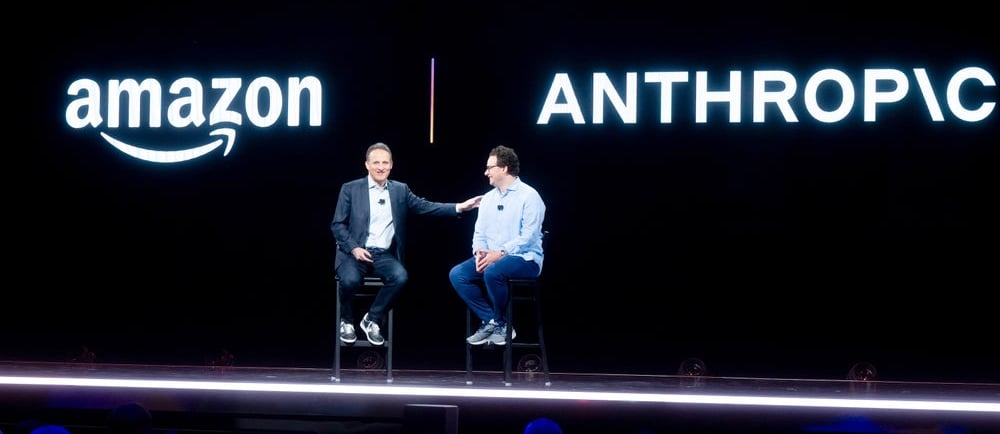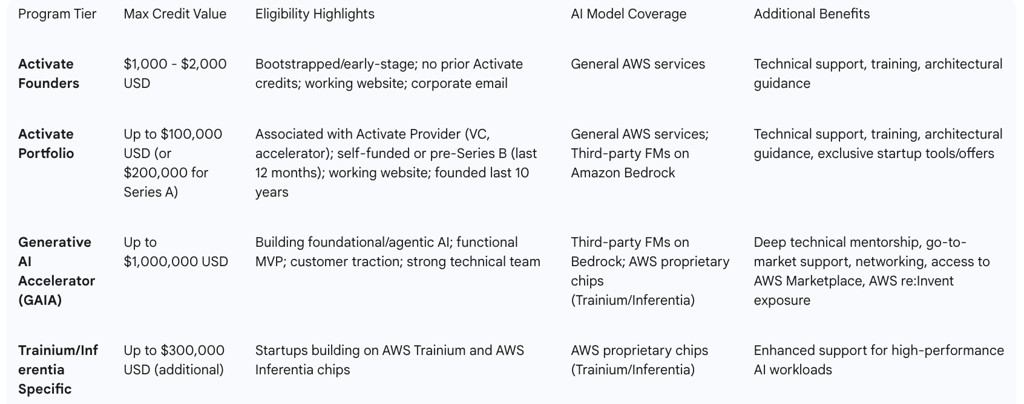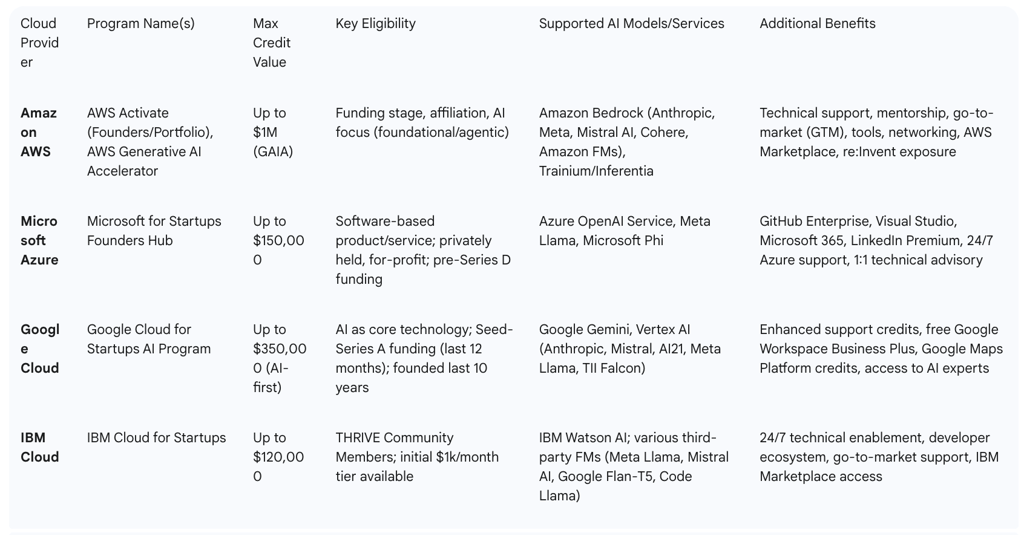Amazon Expands Free Credits Program for Startups to Use AI Models
As part of its efforts to attract startup customers, Amazon now allows its cloud credits to be used for models from other providers, including Anthropic, Meta, Mistral AI, and Cohere.


Amazon Web Services (AWS) has recently undertaken a significant expansion of its free credits program for startups, a move that particularly impacts the burgeoning artificial intelligence (AI) sector. This strategic enhancement now extends credit coverage to include major third-party AI models, such as those from Anthropic, Meta, Mistral AI, and Cohere, accessible through AWS's Amazon Bedrock platform. This initiative is a calculated step aimed at bolstering Bedrock's market share and drawing in a new wave of AI-first startups, positioning AWS as a foundational partner in their development journey.
The expansion is deeply rooted in Amazon's substantial financial commitments to leading AI companies. A prime example is Amazon's $4 billion investment in Anthropic, which includes an agreement for Anthropic to utilize AWS as its primary cloud provider. This symbiotic relationship ensures that Anthropic's advanced models are not only hosted on AWS but are also made accessible to a broader ecosystem of developers and startups via Bedrock, thereby deepening engagement and solidifying AWS's standing as a preferred cloud environment for generative AI innovation.
This initiative intensifies the competitive landscape among the leading cloud providers, including Microsoft Azure, Google Cloud, and IBM Cloud. Each of these giants is actively deploying substantial credit programs and specialized support to attract AI startups, recognizing the immense future value these nascent companies represent. For startups themselves, these credits offer a critical lifeline, significantly reducing initial infrastructure expenditures and accelerating their ability to innovate. However, this also introduces the necessity for careful strategic planning regarding potential vendor lock-in and the long-term management of cloud costs.
II. Introduction: The Evolving AI Startup Ecosystem and Cloud's Central Role
The artificial intelligence landscape is currently undergoing a period of unprecedented acceleration, characterized by an explosion in the number of AI startups and a corresponding surge in the computational resources they consume. This dynamic environment has cemented cloud computing's indispensable role for these emerging enterprises. Cloud platforms provide scalable, flexible, and cost-effective IT infrastructure, democratizing access to resources that were historically exclusive to large corporations with significant capital. This accessibility is particularly crucial for AI startups, enabling them to rapidly prototype and launch Minimum Viable Products (MVPs) without the prohibitive upfront investment in hardware and data centers.
Within this context, cloud credits have emerged as a powerful catalyst for innovation and a vital mechanism for cost reduction. These financial resources, provided by cloud service providers, directly offset the expenses associated with utilizing cloud services. For AI startups, where the processes of training large-scale models and running complex inference tasks can incur exorbitant costs, these credits are often deemed "essential". They effectively reduce operational overhead, extend a startup's financial runway, and enable extensive experimentation, building, and scaling of solutions without depleting precious capital on infrastructure.
The provision of cloud credits by major providers fundamentally alters the landscape for AI innovators. By directly addressing the high, often prohibitive, computational costs associated with AI development, these credits effectively subsidize the most capital-intensive phases of an AI startup's lifecycle. This mechanism levels the playing field, making advanced AI infrastructure and sophisticated models accessible to a broader spectrum of entrepreneurs, even those operating with limited initial funding. The consequence is a more diverse and vibrant AI startup ecosystem, which in turn accelerates overall innovation within the field.
Furthermore, the substantial nature of these credit offerings — with some programs extending up to $1 million from AWS, $350,000 from Google, and $150,000 from Microsoft — positions cloud providers as de facto early-stage investors in the AI space. These amounts are comparable to, and in some cases exceed, typical pre-seed or seed funding rounds for many startups. The explicit strategic intent behind these programs is to attract and retain startups on their respective platforms. By providing such significant "free" resources, cloud providers are making a non-equity investment in thousands of nascent AI companies. This proactive engagement establishes a robust pipeline of future high-paying customers and influences the technological stack choices of these companies from their inception, thereby granting the cloud providers a strategic advantage that extends far beyond traditional sales relationships.
III. Amazon's Enhanced AI Startup Credit Programs
Amazon's commitment to fostering AI innovation within the startup community is evident through its multi-tiered credit programs and specialized initiatives. These programs are designed to support startups at various stages of their development, from bootstrapped ventures to those building foundational AI models.
AWS Activate Program
The AWS Activate program serves as a cornerstone of Amazon's support for early-stage companies, offering not only free cloud credits but also crucial technical support, training, and architectural guidance. This program is structured into two primary tiers:
Activate Founders Tier: This tier is specifically designed for bootstrapped or very early-stage startups that are not yet affiliated with an approved "Activate Provider" (such as an accelerator or venture capital firm). To be eligible, a startup typically needs a functional company website, a corporate business email address, and must not have previously received AWS Activate credits. The maximum credit amount for this tier usually ranges from $1,000 to $2,000.
Activate Portfolio Tier: This tier caters to startups that are associated with an approved Activate Provider, which includes a vast network of accelerators, angel investors, and venture capital firms like Y Combinator, Sequoia, and Techstars. Eligibility criteria for this tier include being self-funded or having received pre-Series B funding within the last 12 months, possessing a working company website, and having been founded within the past decade. Startups in this tier can receive credits ranging from $5,000 up to $100,000. Notably, AWS has recently increased the maximum credit limit for Series A startups to $200,000, demonstrating a heightened commitment to more mature early-stage companies. The application process for AWS Activate is streamlined, requiring an AWS account, submission through the Activate Portal, and typically involves a review period of 7-10 business days.
A pivotal development in the AWS Activate program is the expansion of credit coverage to include third-party AI models on Amazon Bedrock. This means that startups can now use their AWS Activate credits to offset the costs of utilizing leading Foundation Models (FMs) from providers such as Anthropic, Meta, Mistral AI, and Cohere, all accessible through the Bedrock platform. This enhancement empowers startups to experiment with a diverse range of FMs while benefiting from AWS's robust security and privacy features. Furthermore, startups that choose to build on AWS's purpose-built AI chips, Trainium (for training) and Inferentia (for inference), may qualify for up to an additional $300,000 in credits.
AWS Generative AI Accelerator (GAIA)
Beyond the general Activate program, AWS has launched the Generative AI Accelerator (GAIA), an intensive 8-10 week global hybrid program specifically targeting high-potential generative AI startups. This accelerator is a key component of AWS's broader $230 million commitment to accelerate the development of generative AI applications worldwide.
The GAIA program is highly selective, with a less than 2% acceptance rate, choosing only the most promising startups (80 for the 2024 cohort, 40 for 2025). Participants receive deep technical mentorship, strategic go-to-market guidance, and unparalleled access to a global community of innovators and investors. Each selected startup in the GAIA program can receive a substantial sum of up to $1 million in AWS credits. These credits are specifically earmarked to facilitate the building, training, and launching of advanced AI solutions, with a strong emphasis on leveraging AWS's proprietary generative AI tech stack, including their custom-built Trainium and Inferentia chips. Trainium, in particular, offers significant cost efficiencies, providing up to a 50% cost-to-train savings compared to comparable GPUs.
Strategic Imperatives Driving Amazon's Investment
Amazon's extensive investment in AI startup credits and specialized programs is driven by several critical strategic imperatives:
Boosting Amazon Bedrock's Market Share and Attracting AI-First Startups: The expansion of credit coverage, particularly to third-party models on Bedrock, is a direct effort to attract a broader base of startup customers and significantly enhance Bedrock's market share. By offering a comprehensive, multi-model platform that includes popular external models alongside Amazon's own, AWS aims to establish Bedrock as the "first stop" for startups embarking on their AI development journey.
Deepening Ecosystem Engagement and Promoting AWS's Proprietary AI Hardware: As articulated by Howard Wright, Vice President and Global Head of Startups at AWS, this credit expansion is a "gift back to the startup ecosystem" intended to encourage continued reliance on AWS. The emphasis on additional credits for and accelerator focus on Trainium and Inferentia chips represents a clear strategic push for AWS's custom silicon, which offers distinct cost and performance advantages for AI workloads.
Leveraging Strategic Investments to Secure Platform Loyalty: The timing of the credit expansion, following Amazon's $4 billion investment in Anthropic, is highly indicative of a symbiotic strategic play. As part of this deal, Anthropic committed to using AWS as its primary cloud provider and leveraging Trainium/Inferentia chips. This demonstrates how Amazon's direct investments in leading AI companies are designed to funnel high-value AI workloads onto its platform and proprietary hardware, with the credit programs further subsidizing and reinforcing this ecosystem development.
This multi-pronged approach illustrates AWS's comprehensive "full-stack" AI strategy. The company offers credits for general cloud services through AWS Activate , extends these credits specifically to third-party AI models on Bedrock , and provides substantial additional credits for utilizing its proprietary AI chips, Trainium and Inferentia. Furthermore, the dedicated Generative AI Accelerator program, with its large credit allocations and extensive technical support, targets startups building foundational AI. This integrated strategy aims to capture the entire AI stack, from foundational infrastructure (chips, cloud services) to platform-as-a-service (Bedrock with diverse FMs) and specialized programs (accelerators). The objective is to become the default choice for AI startups, irrespective of whether they build on proprietary AWS models, third-party models, or open-source models, thereby maximizing long-term revenue potential from these high-growth customers.
This aggressive strategy also highlights a "subsidize to dominate" playbook in AI infrastructure. Amazon explicitly frames these credits as a "gift" in exchange for startups choosing AWS. Given that AI demand is a significant driver of cloud service usage and revenue growth , this heavy subsidization of early-stage AI development through credits and strategic investments is effectively a means of acquiring future market share in a rapidly expanding sector. The immediate cost of these credits is strategically offset by the anticipated long-term value of retaining these startups as they scale and evolve into major cloud consumers, leading to sustained revenue growth for AWS. This approach simultaneously creates a formidable barrier to entry for smaller cloud providers who may lack the financial capacity to offer such extensive credit programs.
Table 1 provides a comprehensive overview of AWS's various credit tiers and the benefits they offer to AI startups.
Table 1: AWS Activate Credit Tiers and Benefits for AI Startups




